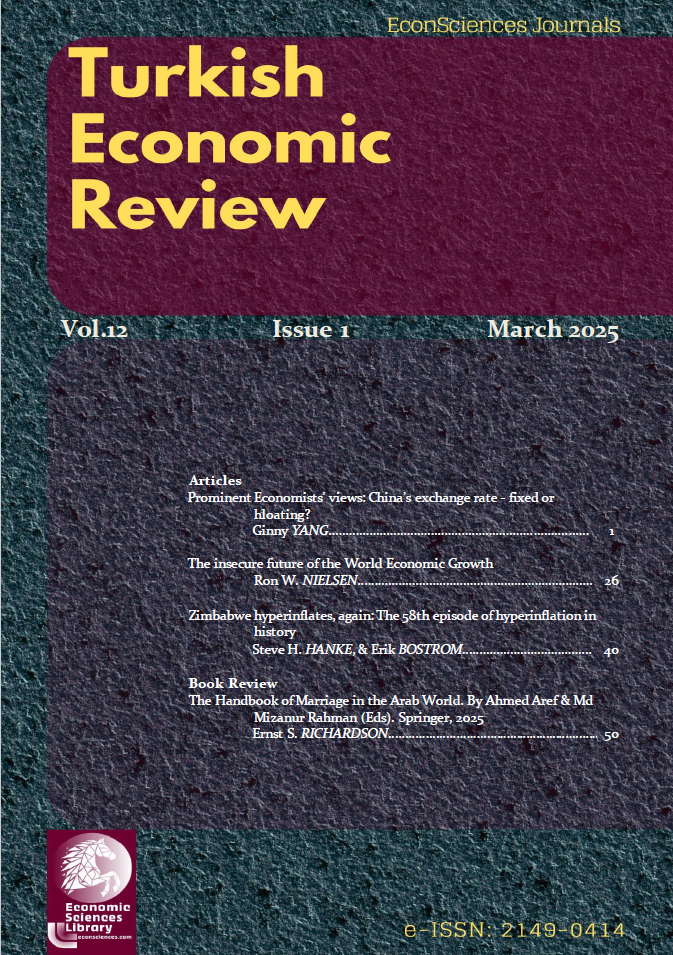Abstract
China’s economy has slowed down in the last several years, with annual GDP growth falling from 10.6 percent in 2010 to 6.7 percent in 2016. In February 2016 Zhou Xiaochuan, the governor of the People’s Bank of China (PBOC), announced a new goal of having a “stabilizing yet flexible” exchange rate to replace the previous policy of de facto gradual appreciation against the U.S. dollar. Observers have since become more uncertain of the PBOC’s next step. Economists have argued for years about the exchange rate system China should adopt—a currency board with a fixed exchange rate, a pegged system such as China had before 2005, or a flexible exchange rate, which could range from managed floating to free floating. What do contemporary economists think about the issue of the exchange rate system? What do they think should be the PBOC’s next move? What opinions do they voice about the new role of China’s currency as a component of the International Monetary Fund’s Special Drawing Right? I collect and analyze the views of several leading economists on the benefits and costs for China of various exchange rate policies.
Keywords. China, RMB, exchange rate, fixed, floating, currency board, SDR.
JEL. E16; E58; F31.
References
Bank for International Settlements. (2016, July). Effective exchange rate indices. Retrieved from http://www.bis.org/statistics/eer.htm
Cecchetti, S., & Schoenholtz, K. (2016, February 21). China’s awkward exchange rate regime. Money, Banking, and the Financial Markets blog. Retrieved from http://www.moneyandbanking.com/commentary/2016/2/21/chinas-awkward-exchange-rate-regime
Cheung, Y.-W., Chinn, M. D., & Fujii, E. (2007). The overvaluation of Renminbi devaluation (NBER Working Paper No. 12850). National Bureau of Economic Research. Retrieved from http://www.nber.org/papers/w12850
Cheung, Y.-W., Chinn, M. D., & Fujii, E. (2009). China’s current account and exchange rate (NBER Working Paper No. 14673). National Bureau of Economic Research. Retrieved from http://www.nber.org/papers/w14673
Chinn, M. (2016, January 12). The next global recession: Made in China? Econbrowser blog. Retrieved from http://econbrowser.com/archives/2016/01/the-next-global-recession-made-in-china
Chinn, M. (2016, February 11). China navigates the trilemma and slowing growth. Econbrowser blog. Retrieved from http://econbrowser.com/archives/2016/02/china-navigates-the-trilemma-and-slowing-growth
EconAcademics. (n.d.). Economic Research Department of the Federal Reserve Bank of St. Louis using RePEc data. Retrieved from https://econacademics.org/
economynext. (2015, August 29). China Yuan moves show futility of US mercantilism: Steve Hanke. Retrieved from http://www.economynext.com/China_Yuan_moves_show_futility_of_US_Mercantilism__Steve_Hanke-3-2806.html
Frankel, J. (2005). On the Renminbi: The choice between adjustment under a fixed exchange rate and adjustment under a flexible exchange rate (NBER Working Paper No. 11274). National Bureau of Economic Research. Retrieved from http://www.nber.org/papers/w11274
Frankel, J. (2009). New estimation of China’s exchange rate regime (NBER Working Paper No. 14700). National Bureau of Economic Research. Retrieved from http://www.nber.org/papers/w14700
Frankel, J. (2011?). Jeffrey Frankel’s activities in conjunction with National Bureau of Economic Research. Retrieved from https://www.hks.harvard.edu/fs/jfrankel/Recent_ConfBksNBER.htm
Frankel, J. (2015). Chinese currency manipulation not a problem. East Asia Forum. Retrieved from https://www.hks.harvard.edu/fs/jfrankel/ChinCurrencyManipEAF.pdf
Frankel, J. (2015, September 10). Misinterpreting Chinese intervention in financial markets. China US Focus. Retrieved from http://www.chinausfocus.com/finance-economy/misinterpreting-chinese-intervention-in-financial-markets/#sthash.iShxbvAD.dpuf
Frankel, J. (2016). Harvard University faculty directory. Retrieved from https://www.hks.harvard.edu/about/faculty-staff-directory/jeffrey-frankel
Frankel, J. (2016). Harvard University faculty Web site. Retrieved from https://www.hks.harvard.edu/fs/jfrankel/index.htm
Hanke, S. H. (1991, October 25). Argentina should abolish its central bank. Wall Street Journal, p. A15. https://search.proquest.com/docview/398264725?accountid=11752
Hanke, S. H. (2008, September). Milton Friedman: Float or fix? Wainwright Economics. Retrieved from https://www.cato.org/publications/commentary/milton-friedman-float-or-fix
Hanke, S. H. (2016a, January 7). China has chosen instability. Cato at Liberty blog. Retrieved from http://www.cato.org/blog/china-has-chosen-instability
Hanke, S. H. (2016b). Our experts. Cato Institute. Retrieved from http://www.cato.org/people/steve-hanke
Hanke, S. H., & Schuler, K. (1999). A monetary constitution for Argentina: Rules for dollarization. Cato Journal, 18(3), 405–419. Retrieved from https://object.cato.org/sites/cato.org/files/serials/files/cato-journal/1999/1/cj18n3-11.pdf
Hong Kong Trade Development Council. (2013, January 30). Rethinking the dollar peg. Retrieved from http://hkmb.hktdc.com/en/1X09RR1Q/first-person/Rethinking-the-Dollar-Peg
Institute for Applied Economics, Global Health, and the Study of Business Enterprise, Johns Hopkins University. (n.d.). Fellows list. Retrieved from http://krieger.jhu.edu/iae/fellows/index.html
International Monetary Fund. (2014, October). People’s Republic of China: Staff report for the 2014 Article IV consultation (Country Report No. 14/235). Retrieved from http://www.imf.org/external/pubs/ft/scr/2014/cr14235.pdf
Kollmeyer, B. (2016, January 4). The Twitter accounts stock-market investors need to follow in 2016. Market Watch. Retrieved from http://www.marketwatch.com/story/worried-about-the-2016-stock-market-follow-these-twitter-accounts-2015-12-18
McKinnon, R. I. (2013). The unloved dollar standard: From Bretton Woods to the rise of China. Oxford University Press.
Mundell, R. (1963). Capital mobility and stabilization policy under fixed and flexible exchange rates. Canadian Journal of Economics, 29, 475–485.
National Bureau of Economics Research. (n.d.). Working paper series. Retrieved from http://www.nber.org/papers.html
Parker, C. B. (2014, October 2). Stanford economics professor emeritus Ronald McKinnon dies at 79. Stanford News. Retrieved from news.stanford.edu/news/2014/october/ronald-mckinnon-obit-100214.html
People’s Bank of China. (2016). Official reserve assets report, January to May 2016. Retrieved from http://www.pbc.gov.cn/diaochatongjisi/116219/116319/3013637/3013641/index.html
People’s Bank of China, State Administration of Foreign Exchange. (2015, December 21). Announcement No. 40. Retrieved from http://www.safe.gov.cn/wps/portal/!ut/p/c4/04_SB8K8xLLM9MSSzPy8xBz9CP0os3gPZxdnX293QwN_f0tXA08zR9PgYGd3Yx8fE_2CbEdFAM9sw9Y!/?WCM_GLOBAL_CONTEXT=/wps/wcm/connect/safe_web_store/state+administration+of+foreign+exchange/rules+and+regulations/115456004b1d6b789332bb2bead6bf4e
Pettis, M. (2015, August 18). Do markets determine the value of RMB? Michael Pettis’ China Financial Markets blog. Retrieved from http://blog.mpettis.com/2015/08/do-markets-determine-the-value-of-the-rmb/
Pettis, M. (n.d.). About Michael Pettis. Retrieved from http://blog.mpettis.com
Pettis, M. (n.d.). Michael Pettis’ China Financial Markets blog. Retrieved from https://econacademics.org/blogs/chinafinancialmarkets.html
SAFE (State Administration of Foreign Exchange, China). (n.d.). About SAFE, major functions. Retrieved from http://www.safe.gov.cn/wps/portal/english/AboutSAFE/Major
Schuler, K. (2005). Ignorance and influence: U.S. economists on Argentina’s depression of 1998-2002. Econ Journal Watch, 2(2), 234–278. https://econjwatch.org/file_download/86/2005-08-schuler-tyranny_statquo.pdf?mimetype=pdf
Setser, B. (n.d.). Follow the Money blog. Council on Foreign Relations. Retrieved from http://blogs.cfr.org/setser/
Setser, B., & Gelpern, A. (2005, September). Argentina’s pathway through financial crisis (Research Papers Series Paper No. 016). Rutgers School of Law-Newark. Retrieved from http://papers.ssrn.com/sol3/papers.cfm?abstract_id=884225
Setser, B., & Roubini, N. (2005, April). China trip report. National Bureau of Economic Research and Center for Economic Policy Research. Retrieved from http://pages.stern.nyu.edu/~nroubini/ChinaTripReport-Roubini-Setser.pdf
Setser, B., & Teslik, L. H. (2009, June 2). China’s difficult choices. Council on Foreign Relations Web site. Retrieved from http://www.cfr.org/china/chinas-difficult-choices/p19546
Trading Economics. (2016). China inflation rate. Retrieved from http://www.tradingeconomics.com/china/inflation-cpi
Trading Economics. (2016). China Yuan. Retrieved from http://www.tradingeconomics.com/china/currency
United States. Department of Commerce. Census Bureau. (n.d.). Retrieved from http://www.census.gov/
Washington University. (n.d.). WTO, China, and the Asian economies (conference description). Retrieved from http://faculty.washington.edu/karyiu/confer/adb02/
XE Currency Charts. (n.d.). Chinese yuan to Hong Kong dollar exchange rate chart. Retrieved from http://www.xe.com/currencycharts/?from=CNY&to=HKD&view=10Y

This work is licensed under a Creative Commons Attribution-NonCommercial 4.0 International License.
